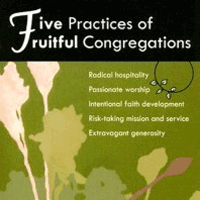How can churches today be as vital as the early Christian communities described in the Book of Acts? How can we reclaim the fruitful piety of the early Methodists? Five Practices of Fruitful Congregations, a new book by United Methodist Bishop Robert Schnase, describes five foundational practices to help congregations be fruitful in ministry to their members and in service to the world.
The book’s goal is to help congregational leaders examine their ministries and assess church practices. But it is much more than detached ministry evaluation. Schnase invites readers to consider what life is like to those entering church for the first time — a challenge to those of us who cut our teeth as infants on the back pew of the church. He helps us see the church through the eye of the visitor or new member, pushing us to remember what life was like before we first felt the comfortable embrace of the church.
This book is an invitation to consider what life would look like if we truly lived in God’s kingdom and ordered our church around practices that invite others to join us.
After establishing this point of reference, Schnase invites us to reflect, “Do we really long for this newcomer to know the joy of the Christian life?” “Do we share the desire that compelled Jesus, the apostles, and John Wesley to help others find a vital faith?” This book is an invitation to consider what life would look like if we truly lived in God’s kingdom and ordered our church around practices that invite others to join us.
Analyzing the basic building blocks of congregational life, Schnase goes on to define the key practices of fruitful congregations. These practices include:
- Radical hospitality — the active desire to bring people to Christ and his church
- Passionate worship — fresh encounters with God that transform lives
- Intentional faith development — learning together in community
- Risk-taking mission and service — an outward focus that changes the world and invigorates the church
- Extravagant generosity — sharing that exceeds all expectations
The adjective in each of these phrases is the key to understanding what makes it fruitful. Without the modifier “radical,” hospitality describes the status quo. Worship, unless it is “passionate,” is business as usual for the church, and so on. As Schnase points out in his final chapter, God longs for the church to be so much more  than it often is today in the United Methodist tradition.
than it often is today in the United Methodist tradition.
Each chapter provides biblical insight and is grounded in Wesleyan theology. Case studies and examples are
helpful in understanding how the practices can be applied. And those using the book with small groups or leadership teams will find discussion questions at the end of each chapter.
Five Practices is a thought-provoking book for congregational leaders who want to see the church fulfill its mission to make disciples of Jesus Christ.







